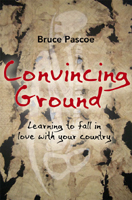History Unrepeated
History Unrepeated
 Convincing Ground: Learn to fall in love with your country
Convincing Ground: Learn to fall in love with your country
Bruce Pascoe
Aboriginal Studies Press, Canberra, 2007
ISBN: 978-085575-549-2
History depends on who writes it and the writing of it creates that history. On that basis, much of the history of this country is still missing. Bruce Pascoe has gone some way to correcting this.
Bruce has managed to illuminate important events in the European settlement of what is now Victoria. Much of it surprised me, having learned my history some forty-five years ago. While the occasional massacre was mentioned, most of the native people, we were told, died because of introduced diseases. The killing was to a large extent explained to us as necessary reprisal for thefts and murders perpetrated by the Aborigines and to ‘teach them justice’. It all seemed very neat and balanced and it was portrayed as inevitable.
Bruce Pascoe begs to differ. After pointing out that the European settlement around Port Phillip was, in fact, illegal, he shows that many of the official accounts sent to Sydney and London were very different from the same correspondents’ personal diaries and their verbal accounts recorded by family and friends. The official documents relied on accounts by settlers of the poor state of Aboriginal society and the makeshift nature of their abodes, which were rarely called houses. Yet, as Bruce points out, the Aborigines in western Victoria built and lived in substantial stone, timber and turf houses, often in extensive villages. “They were big, complex structures but [modern] Australians know nothing about them.”
A few people, such as James Dawson and his daughter Isabella “…incurred the contempt of fellow colonists” for their unashamed interest in the local people, their culture and their language. It did not suit the settlers to acknowledge the complexity and sophistication of Aboriginal society because it got in the way of the claim that no-one owned the land. If you pretend that the people you want to dispossess are of low intelligence and are peripatetic, you can avoid qualms about taking their land. There was a concerted campaign of destruction by the early colonists, which was so successful that those arriving a few years later saw no evidence of these buildings.
Bruce tells of visiting sites where stone foundations can still be seen. However, even more than 150 years after the destruction, there is still resistance to the idea of permanent houses constructed by Aborigines. He recounts the animosity he experienced from members of a local historical society when he enquired about Aboriginal stone structures.
The Aborigines of western Victoria often sustained themselves with abundant fish stocks. There is still evidence of extensive water races and stone fish traps and Bruce cites contemporary descriptions of these. “Witnesses to the miles and miles of water races and aquaculture arrangements must have understood the labour involved in the construction and the sophistication of the design. Those who saw women tending acres of gardens could not have avoided comparison with agricultural practices anywhere.”
Stone houses? Miles of water races? Gardens? Is Bruce Pascoe talking about the same nomadic, simple hunter-gatherers my history teachers spoke of? They are not the same people, because they are portrayed so differently. And therein lies the importance of this tempered and scholarly work.
I say it is tempered, as I could discover no bitterness in the telling. Bruce seems to go out of his way to paint as even-handed a picture of the white settlers as he can. Yes, he criticises them for their greed and their dishonesty and the atrocities they perpetrated, but at the same time, he places these people and their actions in the context of the world as it was then. He doesn’t write history with the judgement of today’s sensibilities and moral codes imposed on the people of the early nineteenth century.
What I found most refreshing in this book, was a sense that Bruce Pascoe set out to give us a more accurate picture of how things were and of who did what and then he says to us: these are the facts as I know them; now use them to reach an understanding of the way things are now and let all of that inform your attitudes, your actions and your voice. “…if we persist in hiding from history we will have learnt nothing from those current and previous civilisations… If you can’t own the past you can’t pretend to own the land and all [her] riches…” Let all this help you learn to fall in love with this country.
This book should be compulsory reading for all teachers and should be on the syllabus of all schools. Forget about ensuring that every Australian and every aspiring immigrant understand the meaning of Gallipoli.
One of the things this book has done for me is help me understand that history also depends on who reads it. Why ‘Convincing Ground’? You will have to read the book.
© 2008-09 Daan Spijer
[to receive an email each time a new review is posted, email me: <daan dot spijer at gmail dot com>]
 CLICK HERE to download a formatted PDF of the above post
CLICK HERE to download a formatted PDF of the above post
 See more of Daan Spijer’s writing and his photos at Seventh House Communications
See more of Daan Spijer’s writing and his photos at Seventh House Communications